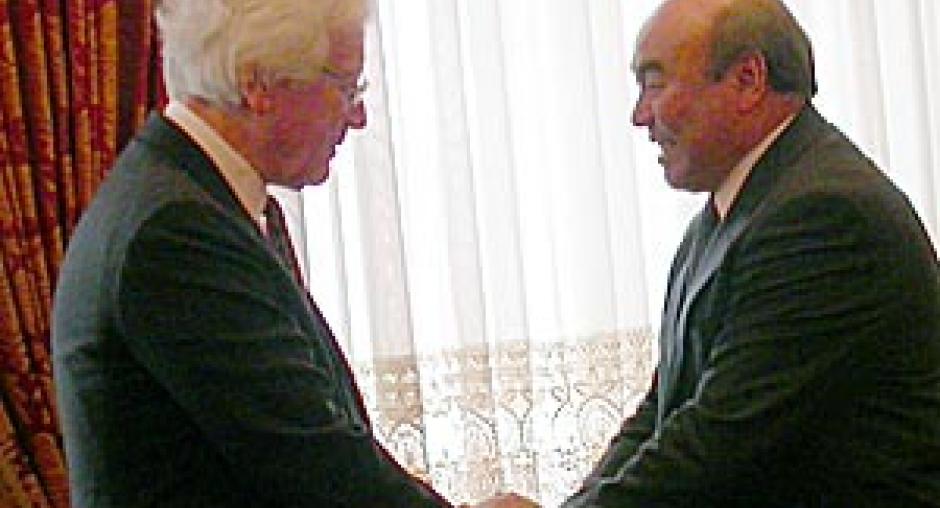Newsroom
OSCE High Commissioner urges implementation of education reform in Kyrgyzstan
THE HAGUE 21 July 2004

OSCE High Commissioner on National Minorities Rolf Ekeus (left) at an earlier meeting with Kyrgyz President Askar Akayev in Bishkek, 14 April 2003. (OSCE) Photo details
THE HAGUE, 22 July 2004 - President Askar Akaev of Kyrgyzstan has welcomed a new report on minorities and education in the country, saying that it would "open up a new phase in the ethnic policy of Kyrgyzstan."
A Working Group on Integration through Education in Kyrgyzstan, established by the President's Office and supported by the OSCE High Commissioner on National Minorities, Ambassador Rolf Ekeus, issued its report and recommendations in Bishkek on Tuesday.
At a meeting with the High Commissioner, the President hailed the document.
The Working Group has elaborated a set of practical recommendations in the area of education policy for the authorities, for national minorities and for international agencies in order to help effect greater social integration within Kyrgyzstan's multi-ethnic society.
Ambassador Ekeus also congratulated the Working Group: "This is a remarkable achievement in producing what is, in many ways, a pioneering effort and in producing a report which will be valuable far beyond Kyrgyzstan."
Speaking at the official launch yesterday, he added:
"The Recommendations of the Working Group are ambitious ones but putting them into practice is an urgent task. The successful implementation of these ideas would make a fundamental contribution to building a prosperous and peaceful Kyrgyzstan."
The Working Group has addressed a number of key challenges faced by multi-ethnic Kyrgyzstan in the area of education, following an intensive investigation of the existing provision of education for Kyrgyzstan's ethnic communities. In particular, the members of the Working Group have recommended measures to promote different forms of bilingual/multi-lingual education, adapted to the need of local communities and based on the principle of choice.
"Bilingualism is our reality," Kyrgyzstan's Education Minister Dr. Mustafa Kidibayev said. "Now we have to move from the teaching of languages to the teaching in languages."
Training of bilingual/multi-lingual teachers, development of new inclusive textbooks and curricula and the need for participation by all ethnic communities in educational policy making have also been prioritised.
The High Commissioner also called on the international community to assist Kyrgyzstan in its aspiration to advance integrated forms of education. He added that his office would be supporting the implementation of the Recommendations of the Working Group in the months ahead.
A Working Group on Integration through Education in Kyrgyzstan, established by the President's Office and supported by the OSCE High Commissioner on National Minorities, Ambassador Rolf Ekeus, issued its report and recommendations in Bishkek on Tuesday.
At a meeting with the High Commissioner, the President hailed the document.
The Working Group has elaborated a set of practical recommendations in the area of education policy for the authorities, for national minorities and for international agencies in order to help effect greater social integration within Kyrgyzstan's multi-ethnic society.
Ambassador Ekeus also congratulated the Working Group: "This is a remarkable achievement in producing what is, in many ways, a pioneering effort and in producing a report which will be valuable far beyond Kyrgyzstan."
Speaking at the official launch yesterday, he added:
"The Recommendations of the Working Group are ambitious ones but putting them into practice is an urgent task. The successful implementation of these ideas would make a fundamental contribution to building a prosperous and peaceful Kyrgyzstan."
The Working Group has addressed a number of key challenges faced by multi-ethnic Kyrgyzstan in the area of education, following an intensive investigation of the existing provision of education for Kyrgyzstan's ethnic communities. In particular, the members of the Working Group have recommended measures to promote different forms of bilingual/multi-lingual education, adapted to the need of local communities and based on the principle of choice.
"Bilingualism is our reality," Kyrgyzstan's Education Minister Dr. Mustafa Kidibayev said. "Now we have to move from the teaching of languages to the teaching in languages."
Training of bilingual/multi-lingual teachers, development of new inclusive textbooks and curricula and the need for participation by all ethnic communities in educational policy making have also been prioritised.
The High Commissioner also called on the international community to assist Kyrgyzstan in its aspiration to advance integrated forms of education. He added that his office would be supporting the implementation of the Recommendations of the Working Group in the months ahead.
